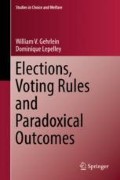Abstract
The standard two-stage voting rules Plurality Elimination and Negative Plurality Elimination are evaluated relative to Borda Rule on the basis of Condorcet Efficiency. Theoretical analysis shows that the Condorcet Efficiency of these two-stage voting rules consistently marginally dominate Borda Rule as the various measures of group mutual coherence change. However, it is also found that the probability that either of the two-stage rules will elect a different candidate than the winner by Borda Rule is quite small. Empirically-based analysis reinforces this observation to lead to the general conclusion that the additional effort that is required to use a two-stage voting rule, rather than simply using Borda Rule, is not likely to be worthwhile. Other benefits are considered that result from using Borda Rule rather than a two-stage voting rule.
Access this chapter
Tax calculation will be finalised at checkout
Purchases are for personal use only
References
Black, D. (1958). The theory of committees and elections. Cambridge: Cambridge University Press.
de Condorcet, M. (1788a). On discovering the plurality will in an election. In I. McLean & F. Hewitt (Eds.), Condorcet: Foundations of social choice and political theory (pp. 148–156). Hants: Edward Elgar.
de Condorcet, M. (1788b). On the form of elections. In I. McLean & F. Hewitt (Eds.), Condorcet: Foundations of social choice and political theory (pp. 139–147). Hants: Edward Elgar.
de Condorcet, M. (1789). On the form of elections. In I. McLean & F. Hewitt (Eds.), Condorcet: Foundations of social choice and political theory (pp. 169–189). Hants: Edward Elgar.
Fishburn, P. C., & Gehrlein, W. V. (1976). Borda’s rule, positional voting, and Condorcet’s simple majority principle. Public Choice, 28, 79–88.
Gehrlein, W. V., & Lepelley, D. (2011). Voting paradoxes and group coherence: The Condorcet efficiency of voting rules. Berlin: Springer.
Gehrlein, W. V., & Lepelley, D. (2016). Refining measures of group mutual coherence. Quality and Quantity, 50, 1845–1870.
Gehrlein, W. V., & Plassmann, F. (2014). A comparison of theoretical and empirical evaluations of the Borda Compromise. Social Choice and Welfare, 43, 747–772.
Gehrlein, W. V., Lepelley, D., & Smaoui, H. (2011). The Condorcet efficiency of voting rules with mutually coherent voter preferences: A Borda compromise. Annals of Economics and Statistics, 101/102, 107–125.
Gehrlein, W. V., Lepelley, D., & Plassmann, F. (2017, forthcoming). An evaluation of the benefit of using two-stage election procedures. Homo Oeconomicus.
Lepelley, D., Moyouwou, I., & Samoui, H. (2015). Monotonicity paradoxes in three-candidate elections using scoring elimination rules. Social Choice and Welfare. doi:10.13140/RG.2.1.5075.4961.
Miller, N. R. (2016). Monotonicity failure in IRV elections with three candidates: Closeness matters. Working paper. Available at http://userpages.umbc.edu/~nmiller/
Saari, D. G. (1989). A dictionary for voter paradoxes. Journal of Economic Theory, 48, 443–475.
Saari, D. G. (1990). The Borda dictionary. Social Choice and Welfare, 7, 279–317.
Saari, D. G. (1996). The mathematical symmetry of choosing. Mathematica Japonica, 44, 183–200.
Saari, D. G. (1999). Explaining all three-alternative voting outcomes. Journal of Economic Theory, 87, 313–355.
Santucci, J. (2016, October 13). Will ranked-choice voting succeed in Maine? That depends on the Democrats. Washington Post. Available at https://www.washingtonpost.com/news/monkey-cage/wp/2016/10/13/will-ranked-choice-voting-succeed-in-maine-that-depends-on-the-democrats/?utm_term=.b638c7d53918
Seelye, K. Q. (2016, December 3). Maine adopts ranked-choice voting: What is it and how will it work. New York Times. Available at https://www.nytimes.com/2016/12/03/us/maine-ranked-choice-voting.html?_r=0
Wright, S. G., & Riker, W. H. (1989). Plurality and runoff systems and numbers of candidates. Public Choice, 60, 155–175.
Young, H. P. (1974). An axiomatization of Borda rule. Journal of Economic Theory, 9, 43–52.
Author information
Authors and Affiliations
Rights and permissions
Copyright information
© 2017 Springer International Publishing AG
About this chapter
Cite this chapter
Gehrlein, W.V., Lepelley, D. (2017). Two-Stage Election Procedures. In: Elections, Voting Rules and Paradoxical Outcomes. Studies in Choice and Welfare. Springer, Cham. https://doi.org/10.1007/978-3-319-64659-6_5
Download citation
DOI: https://doi.org/10.1007/978-3-319-64659-6_5
Published:
Publisher Name: Springer, Cham
Print ISBN: 978-3-319-64658-9
Online ISBN: 978-3-319-64659-6
eBook Packages: Economics and FinanceEconomics and Finance (R0)

